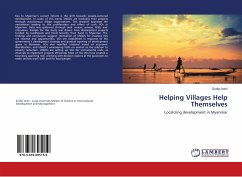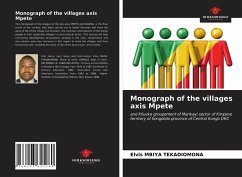
Helping Villages Help Themselves
Localizing development in Myanmar
Versandkostenfrei!
Versandfertig in 6-10 Tagen
27,99 €
inkl. MwSt.

PAYBACK Punkte
14 °P sammeln!
Key to Myanmar's current reform is the shift towards people-centered development. In wake of this trend, I/NGOs are localizing their projects through autonomous village organizations. This research appraises the motivations leading to the proliferation and effect of such VOs in Myanmar. Data was gathered through desk review, surveys, FGDs and interviews. Sample for this study was drawn from development projects funded by Livelihoods and Food Security Trust Fund in Myanmar. The findings and conclusions suggest: motivation of I/NGOs for creating VOs are reactive and opportunistic; VOs are establ...
Key to Myanmar's current reform is the shift towards people-centered development. In wake of this trend, I/NGOs are localizing their projects through autonomous village organizations. This research appraises the motivations leading to the proliferation and effect of such VOs in Myanmar. Data was gathered through desk review, surveys, FGDs and interviews. Sample for this study was drawn from development projects funded by Livelihoods and Food Security Trust Fund in Myanmar. The findings and conclusions suggest: motivation of I/NGOs for creating VOs are reactive and opportunistic; VOs are established in response to the government's development strategy and gradual opening of development space in Myanmar. VOs also manifest national mood of economic liberalization, and I/NGO's unwavering faith on market as the solution to poverty reduction. I/NGOs are setting up VOs for instrumental ends, as channels to implement projects efficiently. Most of the VOs have created a boundary spanning role, working with decision makers at the grassroots to make services work with and for local people.












